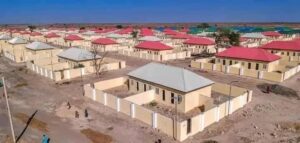
Experts foresee rebound of dollar-priced properties
Following the Central Bank of Nigeria’s (CBN) new foreign exchange policy, real estate stakeholders are optimistic that the demand for luxury dollar-priced rental properties may rebound.
The downturn in the economy, coupled with uncertainties in the foreign exchange market has changed a number of market fundamentals, creating opportunities for investors and home seekers, especially in the high-end segment of the rental market.
Prices of luxury properties have climbed steadily over the past few years in major cities such as Lagos and Abuja. This created a lot of vacancies averaging 30 per cent as supply outstripped demand in a market, which used to be an attraction to expatriates that come into the country for businesses and other official reasons,lending support to foreign capital inflows.
Lagos remains the hub of financial, commercial, manufacturing, and aviation activities, where many expatriates with attendant high volume of dollar-priced transactions operate.
Nigeria’s real estate growth rate stood at 5.31 per cent in the first quarter of 2023, with a three per cent basis points decline from 5.34 in the first quarter of 2022. The total Gross Domestic Product (GDP) growth for the real estate sector stood at 5.64 per cent in the full year of 2022.
The inflation rate in Nigeria rose for the fourth month to a near 18-year high of 22.41 per cent in May 2023, up from 22.22 per cent in the prior month. The development has impacted negatively on prices of goods and services including rent and cost of property.
In locations like Ikoyi, Victoria Island and Lekki axis, rents/sale prices are often quoted in dollars, hence incidences of dollar-denominated sale agreements. Prices for most luxury residential buildings start from $80,000 to $150,000 yearly or more in locations like Banana Island and old Ikoyi, Lagos.
Although, a provision of Central Bank of Nigeria Act of 2007, frowns at increasing use of foreign currencies in the domestic economy as a medium of payment for goods and services by individuals and corporates since 2015, some listings still come with offering in dollars, but benchmark by deploying exchange rate at conversion in payment via local currency.
Specifically, Ikoyi represents the creme of real estate investments in Nigeria and as such, there is a constant demand for it. Majority of the top chief executive officers, industrialists, diplomatic Corp, live in Ikoyi and have offices or residences there.
Factors responsible for dollarisation of real estate transactions include, increased population of expatriates; foreign exchange market structure; willingness of expatriate tenants to pay in dollars; bulkiness of naira notes in huge volume transactions; and incidence of money laundering.
The optimism of experts in the sector is based on the fact that previous multiple exchange rates created room for rent seeking and arbitrage, as well as distorted the exchange rate management system to the extent that access to the official window and lower rate was difficult.
But there is hope for increased supply of dollar currency in the market with the Federal Government’s new exchange rate unification policy. The CBN had pulled the plug on the foreign exchange (FX) market to allow gradual rates harmonisation around the Investors’ and Exporters’ (I&E) window.
Speaking on the development, an estate surveyor and valuer, Prof. Austin Otegbulu, said the heightened exchange rate crisis in the past years affected the performance of the market as most of expatriates thatrequire such properties be it residential and commercial left the country.
Otegbulu, who is also a professor of Asset, Environmental Valuation and Investment Decision Analysis, noted that with attempts by the Federal Government to unify the exchange rate, operators are optimistic for a rebound of the market, if the policy is well implemented to warrant massive return of foreign investors into the country.
He said at the initial stage when investors returned, they may settle for serviced apartments. However, he said if they are convinced that there is economic stability and prosperity, that can trigger demand for luxury properties that are benchmark in dollar.
He said the market can only thrive on the forces of demand and supply and the ability of the renters to pay, adding if the economy cannot sustain the payment asked for by property owners, the demand may remain down.
“We once had high demand for such properties, when there were few serviced apartments that are compliant with international standards and mainly occupied by expatriates and representatives of big companies.
“When there is scarcity, the seller dictates the tune and people are asked to pay in dollars. But the subscribers find it difficult as the value of naira keeps depreciating. If somebody is earning in Naira and something he was buying for N160 suddenly becomes N720 to one dollar and finds out that the one in Naira has not changed, so most of them had to bring down dollar prices of the properties. The ability to pay in dollars is very difficult now,” he said.
Otegbulu said, “Most of the expatriates left Nigeria because their companies were not doing well again and so, it was difficult for them to sustain paying rents for dollarised properties. Even some of the grade A’ office spaces, which are green certified buildings, especially on Ozumba Mbadiwe Way in Victoria Island, when they were completed, the rent were about $1,200 per square metre initially but along the line, it became $1000 as the economy was down and at a point it came to $600 to $650 per square metre.
“There was a situation of someone who was paying a higher amount in dollars, then they wanted to move out because the renter cannot afford it any more. The valuer who was close to the owner had to advise him that instead of allowing the renter to move out and the place becomes vacant, it is better to reduce rent and so he had to take the advice.”
He pointed out that the new monetary policy relating to the foreign exchange unification is quite laudable, but stated that it will take the economy to start witnessing the positive effects before it can cause a rebound in the real estate industry.
Head of Research, Diya, Fatimilehin & Company, Mr. Tola Oyenekan, explained that when an economy is not doing well, the expatriates leave. He said that is why we have seen increased vacancies in luxury apartments as most of the expatriates exited their property.
Oyenekan said, “It is not just the unification, we are also looking at access. So, there is increased access to get dollars now because the limitations are not there anymore. I believe you can walk into any bank and request for dollars having removed the limit. You can get as high as $10,000 in a day.
“What that means is that there will be increased supply. There is more foreign currency in the hands of people and so, if you want to do transactions in foreign currencies regarding properties, you can actually do it.
“But looking at it from the investor’s angle, especially for somebody who has been getting his money in dollars or returns in dollars, gone are those days when you get your returns in dollars and you go to the black market and because of the disparity in the black market and official rate, you expect to have a huge difference to your advantage. This has given the black market operators a run for their money. Everybody is now operating at a rate that is similar.”
He emphasised that once there is increased access to foreign exchange, which is what foreign investors have always wanted, it means the market has become more attractive for foreign investors and that means foreign investors can do more businesses in Nigeria and rent more properties because some of the dollarised properties are actually taken and occupied by expatriates.
Oyenekan said: “What is going to happen now is that some of the expatriates will start coming back and what that means is an interest in luxury properties, hence, those prices of properties that are benchmarked in dollars will go up.
For now, many of the luxury properties in highbrow locations in Lagos will have to allow the existing rents to run till the end of the lease. Maybe upon renewal of rent, the managers of the properties may have to jerk up the rents. The service charge of some of these properties will go up because there is already a rising cost of fuel due to the removal of subsidy, which will impact service charge on properties.
He pointed out that there would be a reduced number of properties that will be benchmarked in dollars. For instance, he said if a tenant paid $10,000 for a property before, what that means is that you are going to pay a bit more.
“The demand can’t be as high as before because of the rise in price and people will have to pay more. The landlords and owners of the property will also have to re-strategise their offerings. What leads to price rise is demand. If there is an increase in demand for property, the price will go up. With the current development, demand can’t be as high, because there is low purchasing power. In a case when somebody is still interested in luxury dollarised property he or she must be ready to pay much,” Oyenekan said.
A former Chief Executive Officer, Knight Frank Nigeria, Joe ldudu, said demands for luxury apartments benchmarked in dollars in locations like lkoyi have slumped due to rising prices.
Idudu said: “But now that we have just a single market, we will see what will happen, otherwise in Naira terms, everything becomes so heavy. Can you imagine such millions of naira in rent? It is ridiculous. They will tell you $10 million and that amount before now multiplied by N700, is about N7 billion.”



